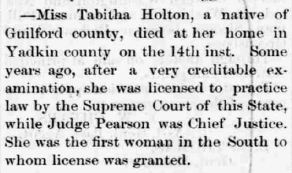 We are at a cultural moment.
We are at a cultural moment.
Sexual boundaries seem to be the “acutest issue” of the moment.
These are not new questions to North Carolina. This moment is not the first.
In Greensboro in 1878, Quaker editor David Swaim thundered in Greensboro’s leading newspaper: “Blast the prejudice that puts women down as only fit to be men’s playthings!”
His conservative counterpart, former Supreme Court Justice and founder of the UNC Law School, William Horn Battle rejoined: “No Southern lady should be permitted to sully her sweetness by breathing the pestiferous air of the courtroom.”
They were arguing about whether women should be permitted to practice law.
The issue was joined in Greensboro and taken to Raleigh. Leading North Carolina legal figures of the day took up the question: Albion Tourgée, William Horn Battle, Richmond Mumford Pearson.
It is the story of Jamestown native Tabitha Holton who became the first woman lawyer in the South.
A circular published when Holton died proclaimed:
The power of thy genius has broken the iron bands of brutality which had been rivited [sic] for ages upon thy sex. No more can the barbed shaft of prejudice and envy reach thee in thy eternal repose.
First in all the Sunny South to claim, and obtain, the full rights of womanhood
Tabitha Holton’s story is fabulized here. Her victory, which upset the custom and practice of centuries, was, in the end, based on merit. Opposition based on her status as a woman failed to stand against her unquestioned merit as a lawyer.


